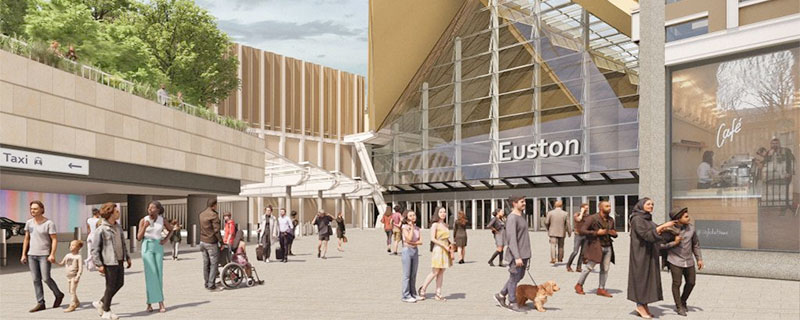Government Dithering over Cash for Euston High Speed Delivery
A key figure leading delivery of the Euston High Speed 2 (HS2) station has accused the government of dithering over attempts to get private cash in to rescue the paused project.
Mace chief executive Mark Reynolds said chancellor Jeremy Hunt had called him asking for support with the plan to attract investment into the £6.5bn central London scheme, but had not followed through.
Ministers announced in October that HS2 would only go to Euston if private cash could be found to pay for the redevelopment of the station and its immediate site.
Reynolds said Mace – which is acting as main contractor on the HS2 Euston project, in a joint venture with Spanish firm Dragados – had expressed willingness to work with the government on the plan but heard nothing back.
“It’s gone into a black hole,” he told London business title City AM.
“The chancellor phones us up and says, ‘can we have your help? Can you come up with a private sector finance proposal?’
“We have a private sector finance proposal […] But they haven’t come back and spoken to us yet.
“While we are happy the government is working to get private money into the project, we’ve heard nothing from them on it yet. It’s a frustration.”
Reynolds said time was of the essence if HS2, which has already been substantially slashed down to a shuttle between west London and Birmingham, is to serve the centre of the capital when it eventually opens. This will require the boring of the 7.2km twin tunnels from Old Oak Common to Euston, which are currently paused until the government gives the green light.
“If you leave it for another six months, then you start running into a problem with Old Oak Common to Birmingham being completed, but Euston not being completed,” Reynolds warned.
“Every day a decision isn’t made […] is a day that HS2 won’t work as a full functioning London to Birmingham system.”
Rail operations consultant William Barter said ministers should prioritise construction of the rapid rail link to central London regardless of where the cash comes from.
“Private finance must not be made a sine qua non of completing HS2 to Euston,” he insisted. “To run any serious train service on HS2, Euston is vital both operationally and commercially, and the government is absolutely wrong to see Euston as a property project with a station as a side-hustle.”
He added: “If ministers really sees private finance as essential, you would expect them to be pursuing it enthusiastically.”
The government paused HS2 work at Euston earlier this year after costs escalated wildly. Reynolds said in September that the decision came “out of nowhere”.
“We had to demobilise 200 people, supply chain and contractors,” he added.
The messaging from within government has been extremely positive on the possibility of attracting private finance for the Euston project.
Transport secretary Mark Harper told the Transport Committee in November that “the interest in delivering Euston with the Development Corporation has actually been very extensive” while rail minister Huw Merriman said he was confident the government could “harness the power of the private sector” to deliver a transformative “life science quarter” at Euston.
Other parties have been less positive. London mayor Sadiq Khan last month poured scorn on the government’s plan to get other parties to fund the Euston development, which is also proposed to include thousands of homes.
“There’s not a cat in hell’s chance of the private sector completely paying the £6.5bn,” he said.
“Who’s going to build the tunnel from Euston to Euston Square? Who’s going to build the connection from Euston to Old Oak Common? Who’s going to improve the public realm? Who’s going to give permission for 10,000 homes and the impact on the local community?”
National Infrastructure Commission chair Sir John Armitt also told the Financial Times that he thought it unlikely that the private finance plan would succeed.
“At the end of the day the government will need to be ready to fund the core civil engineering for the final miles of the project,” Armitt told the FT.
A Department for Transport spokesperson insisted this week:
“As has always been the case, the line will finish at Euston.
“The new plan for Euston represents a world class regeneration opportunity that offers greater value for money for taxpayers. Our approach has been successfully carried out recently – including in regenerating Battersea Power Station and King’s Cross – and there has already been significant interest from the private sector to invest.”
Source: Civil Engineer









Leave a Reply
Want to join the discussion?Feel free to contribute!